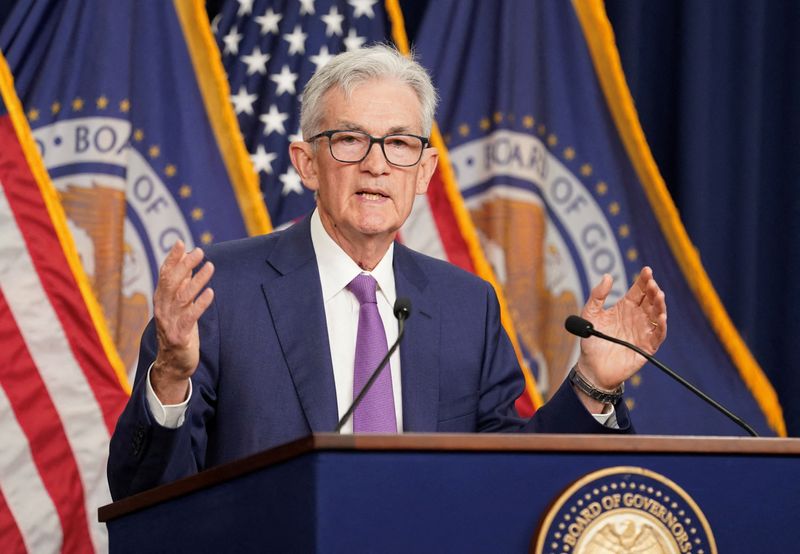By Howard Schneider
WASHINGTON (Reuters) - Through a tumultuous period of high inflation, aggressive interest rate hikes, and global instability, the U.S. Federal Reserve received relatively high marks for its monetary policy communications despite the thicket of uncertainty it has been navigating, according to a survey of academic and private-sector analysts released on Thursday.
Responses from 31 academic and 24 private Fed watchers to questions posed by the Brookings Institution's Hutchins Center on Fiscal and Monetary Policy gave the U.S. central bank under Fed Chair Jerome Powell a median score of B+ for its overall communications, an important aspect of central bank operations that can make monetary policy itself more or less effective.
The score was slightly lower than the median of A- the Powell-led Fed received in a 2020 survey conducted as the central bank rolled out a complicated series of programs in response to the COVID-19 pandemic.
But it still showed the Fed's core communications tools, in particular the press conference that Powell holds after each policy meeting, playing an "extremely useful or useful" role in explaining the central bank's decisions and outlook.
More than 80% of respondents regarded Powell's press conference that way, and more than 70% said the same about the quarterly economic outlook that assembles the views of policymakers about inflation, unemployment and economic growth, and the Fed's policy statement itself.
The "dot plot" of policymakers' rate projections got a more mixed review, as it was seen as extremely useful or useful by only about half the respondents, reflecting ongoing debate about whether that particular bit of Fed communication is more confusing than clarifying.
Speeches by other members of the Fed's Board of Governors, the Fed's 12 regional bank presidents, and media coverage were seen as even less compelling, with more than 60% of respondents regarding them as only somewhat useful or not useful at all.
The survey was conducted between March 22 and April 5, as the Fed was in the midst of what turned into a resetting of expectations away from an outlook of imminent rate cuts to one of more sustained tighter monetary policy.
The switch was just the latest communications challenge Powell has faced, and he has not come off well across the board.
Views of Fed communications slipped in a New York Fed survey of Wall Street primary dealers conducted in January, though the Powell-led Fed has scored better among that group on average than when his predecessors, Janet Yellen and Ben Bernanke, headed the central bank.
An annual Gallup poll of U.S. economic stewardship released this week also showed continued low public confidence ratings for Powell, with just 39% of respondents saying they had a "great deal or a fair amount of confidence" in him to "do or to recommend the right thing for the economy."
His latest mark was slightly higher than the 36% he got last year, a low point among Fed chiefs and a sharp decline from the nearly 60% confidence rating Powell received during the thick of the COVID-19 response when the Fed was back-stopping the economy in unprecedented ways. It also showed a deep partisan divide, with 56% of Democrats and just 30% of Republicans voicing confidence in Powell, a veteran of past Republican administrations who has nevertheless won Fed appointments from presidents in both parties.
WEIGHT OF POWELL'S WORDS
Fed officials regard their communications as a separate instrument of policy. The central bank issues closely edited statements after each policy meeting where the addition or deletion of an adjective can rock financial markets, and releases assorted other documents including meeting minutes and anecdotal economic reviews in between those meetings. Fed officials also give a plethora of interviews and public speeches - perhaps too many.
Nearly 60% of respondents felt the Fed regional bank presidents should talk less, while 88% said Powell should speak the same amount or more, evidence of the continued primacy of his words despite the premium he has put on consensus.
The Brookings survey included topics beyond Fed communications, and notably found a strong two-thirds majority of respondents opposed raising the current 2% inflation target, a policy option Fed officials have roundly rejected at least for the time being.
Regarding the Fed's current approach to monetary policy, which was overhauled in 2020 and is due for review soon, there was general support for retaining its emphasis on maximum employment.
There was less support for keeping an approach to managing inflation which aims to use periods of above-target inflation to make up for times when inflation is weak - a strategy that made sense when it was adopted, after a decade of tepid price increases, but which seemed dated after the eruption of inflation to a 40-year high in 2022.
About 60% of respondents said the Fed should "substantially revise" or at least "tweak" that part of its operating framework.
